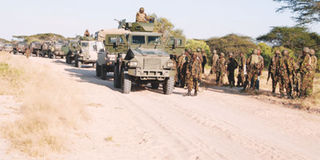US places Sh3bn bounty on leaders of Al-Shabaab

A KDF convoy leaves Beliis Quuqani area for Afmadhow. Photo/FILE
A price of Sh2.9 billion has been put on the heads of the leaders of Somali terrorist group Al-Shabaab by the United States government.
The money will be paid to any person who provides information which leads to the capture of the leaders. Read (Police arrest Al-Shabaab militant in border ambush)
This is the first time that the US is putting a bounty on the leaders of the group, which declared that it was merging with Al-Qaida earlier in the year.
According to BBC, a price of Sh616 m ($7m)is being offered for information on al-Shabaab founder and commander Ahmed Abdi aw-Mohamud Godane, Sh440 million ($5m) on information relating to co-founder Ibrahim Haji Jama, Fuad Mohamed Khalaf, also known as Shongole, who is the terror group’s financier, Bashir Mohamed Mahamoud and military commander Mukhtar Robow, also known as Abu Mansur. Robow doubles up as the terror group’s spokesman and propagandist.
A reward of Sh264 million ($3m) has also been put on the head of Zakariya Ismail Ahmed Hersi, intelligence chief, and Abdullahi “Yare”, a senior figure in the terror group.
America appears to have shifted its focus to Al Shabaab after dealing a major blow to Al Qaeda operations in Afghanstan and Pakistan following the killing Osama bin Laden and and his repesentative in East Africa, Fazul Abdalla last year.
Robert Hartung, an assistant director at the US state department’s bureau of diplomatic security, said: “Every time we add someone to the Rewards for Justice site, that is a signal that the US government takes the fight against terrorism very seriously.”
Al-Shabaab leaders are reported to be fleeing Kismayu, heading back to Puntland or leaving the country for Yemen.
Kenyan and Somali government forces are advancing on the port city after capturing Afmadow in Southern Somalia last week.
But there have also been reports that Al Shabaab has acquired or is seeking to acquire anti-aircraft missiles from illicit arms traffickers and jihad networks in the Middle East.
A new report circulating within the diplomatic and intelligence community claims Al-Shabaab has received a number of SA-18 long-range surface-to-air missiles (SAMs), which pose a greater danger to low-flying commercial jetliners and helicopters than fighter jets.
These reports are not new: Four months ago there were fears that the group had procured close to 30 SAM-7 missiles from the black market. The missiles were said to have been part of a Libyan arsenal looted last year.
KDF does not think Al-Shabaab has such capability, with its spokesman, Colonel Cyrus Oguna, dismissing the reports of new arms acquisition as “misleading”.
He argued that Al Shabaab would not have fled Afmadow if they had the arms alleged to be in their possession.
“This is unlikely given reports indicating that Al Shabaab is appealing to Kismayu residents, especially the youth, to defend the city from an allied attack and by also indicating they would now be relying on the Quran as a weapon.
“As far as we are concerned, Al-Shabaab is now destroyed and that is why the generals are even fleeing from Kismayu. Which soldier will be ready to fight without a general?” he posed.
The African peacekeeping Mission in Somalia, Amisom, is yet to officially comment on the reports.
A source familiar with Amisom’s thinking downplayed the new claims, suggesting they were exaggerated.
“There is no alarm,” he said, adding such reports were routinely received.
Al-Shabaab’s attempt to gain tactical air defence capabilities is understandable and come against the backdrop of major military setbacks and the looming battle for the strategic southern port city of Kismayu.
However, even if the group has mastered the skill and proficiency to deploy these weapons that alone is unlikely to tilt the military balance or improve its overall prospects.
The most they can do is to slow down the African armies advancing on multiple fronts, which, perhaps, may use airpower in the initial stages of the assault on Kismayu.
Security at the Mogadishu airport is now tighter than at any time in the last 20 years.
A US-based private logistics company, SKA, has been contracted to manage the airport.
New security scanners have been installed; the perimeter fence strengthened and plans are said to under way to install anti-missile decoy systems, among them infra-red beacons and other electronic devices.
A joint-covert operation is said to be under way to track down the weapons, step up vigilance at airports and improve intelligence gathering in a bid to foil any attempt by Al-Shabaab to carry out attacks on civilian aircraft.
Kenya’ has heightened security alert level in anticipation of the planned offensive to take Kismayu before August.




